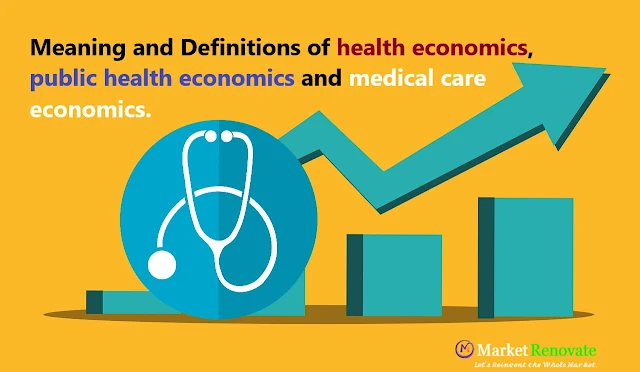Meaning and Definitions of health economics, public health economics and medical care economics
a) Meaning and Definitions of Health Economics
Health economics is a specialized branch of economics that focuses on understanding the production, distribution, and consumption of health and healthcare services. It applies economic principles and methodologies to examine the allocation of resources in the healthcare sector, the impact of healthcare policies, and the efficiency of health interventions.
Health economics seeks to address questions related to healthcare financing, resource allocation, cost-effectiveness of medical treatments, and the economic implications of various health policies. Lets go through some of the important definitions of health economics.
i. Folland, Goodman, and Stano (Authors of “The Economics of Health and Health Care“): “Health economics is the application of the principles of economics to the health and health care sector. It is the study of how scarce resources are allocated among alternative uses for the care of sickness and the promotion, maintenance, and improvement of health, including the study of how individuals and societies make choices about health care, the costs and benefits of health care resources, and the arrangements for and results of those choices.”
ii. Charles E. Phelps (Health economist and author of “Health Economics”): “Health economics is concerned with the efficiency and effectiveness of resource allocation in the health sector. It studies what is produced with the resources allocated to health care, how health care is produced, and what effects the consumption of health care has on health.”
iii. Alan Maynard (Health economist and professor at the University of York): “Health economics is about health and health care, not just health care. It is concerned with the production and consumption of health care and the effectiveness, efficiency, and equity of health services and health care delivery.”
b) Meaning and Definitions of Public Health Economics
Public Health Economics is a subfield of health economics that specifically examines the economic aspects of public health issues and interventions. It focuses on understanding the economic drivers of population health, the impact of public health policies and programs, and the allocation of resources to improve health outcomes at the community and societal level.
Public health economics is concerned with promoting health, preventing diseases, and improving the overall well-being of populations. Some of the major definitions of public health economics are given below:
i. James A. Rice (Health economist and author of “Health Economics: Theory, Insights, and Industry Studies”): “Public health economics involves the application of economic theories and methods to identify, quantify, and value the health effects and efficiency of public health policies and programs.”
ii. Erik Nord (Health economist and researcher): “Public health economics analyzes how economic incentives, constraints, and institutions affect health behaviors, population health status, and the provision of public health and medical care services.”
iii. Robert L. Ohsfeldt and John E. Schneider (Authors of “The Business of Health: The Role of Competition, Markets, and Regulation”): “Public health economics is concerned with the efficient allocation of resources to maximize the health of populations. It examines issues related to preventive measures, health promotion, disease control, and health policy interventions.”
c) Meaning and Definitions of Medical Care Economics
Medical Care Economics is a subfield of health economics that specifically focuses on the economic aspects of medical care and healthcare services. It delves into the production, consumption, and financing of medical treatments, healthcare delivery systems, and the cost-effectiveness of medical interventions.
Medical care economics aims to understand the economic factors influencing medical decision-making, patient behavior, and the organization of healthcare providers. Some notable definitions of medical care economics are as follows:
i. Bruce R. Kizer (Health economist and author of “Medical Care Economics”): “Medical care economics is the study of the allocation of resources to, and within, the medical care sector. It is concerned with the economic forces that influence the production, consumption, and distribution of medical care.”
ii. John F. Chomiczewski and Michael J. Morrisey (Authors of “Medical Care Economics: Principles and Practice”): “Medical care economics focuses on the economic aspects of health services, including the supply and demand for medical care, the role of physicians and other health professionals, and the financing and delivery of health services.”
iii. Anthony J. Culyer and Joseph P. Newhouse (Editors of “Handbook of Health Economics”): “Medical care economics investigates the efficiency, equity, and organization of health services. It examines the economic factors affecting the demand for medical care, the supply of healthcare services, and the mechanisms for financing and delivery of medical services.”
Differences between health economics, public health economics and medical care economics
| Aspect | Health Economics | Public Health Economics | Medical Care Economics |
|---|---|---|---|
| Focus | Examines health and healthcare services. | Focuses on the economic aspects of public health. | Concentrates on the economic aspects of medical care. |
| Scope | Broadly encompasses health and healthcare. | Specifically deals with public health issues. | Specifically addresses medical treatments and healthcare. |
| Objective | Analyzes resource allocation in healthcare. | Studies health policies and population health. | Explores the economics of healthcare services and delivery. |
| Level of Analysis | Individual and healthcare system levels. | Community and societal levels. | Individual patient and healthcare provider levels. |
| Main Concern | Cost-effectiveness of healthcare interventions. | Efficiency of public health programs and policies. | Efficiency and equity in the delivery of medical services. |
| Typical Questions | How to allocate healthcare resources? | What policies best promote population health? | How to optimize medical care delivery and financing? |
| Examples of Topics | Healthcare financing, health insurance. | Disease prevention, health promotion. | Medical treatments, healthcare organization. |







Please leave your comments or ask your queries here. The comments shall be published only after the Admin approval.